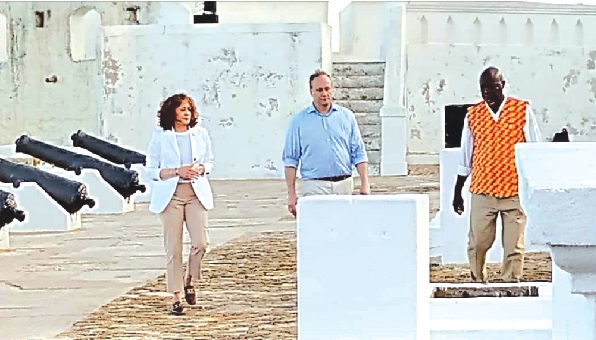
US Vice-President deplores slave trade horrors
The visiting US Vice-President, Kamala Harris, has deplored the inhumane treatment, horrors and atrocities that occurred in the forts and castles along the coast of West Africa in the era of the slave trade.
Advertisement
She said those stories needed to be remembered and taught and the history learnt, since they could not be denied.
"There are dungeons here where human beings were kept – men, women and children. They were kidnapped from their homes; they were transported hundreds of miles from their homes, not really sure where they were headed.
“And they came to this place of horror – some to die, many to starve and be tortured, women to be raped – before they were then forcibly taken on a journey thousands of miles from their home to be sold by so-called merchants and taken to the Americas and the Caribbean to be an enslaved people.
"We don't know the numbers who died on their way to this place; the numbers who were killed during that passage on the Atlantic. The horrors of what happened here must always be remembered. The slave trade cannot be denied. It must be taught. History must be learnt," she said.
Castle
Ms Harris said this last Tuesday when she visited the Cape Coast Castle as part of her three-day visit to Ghana.
She was accompanied by her husband, Douglas Emhoff.
Others in her entourage were the US Ambassador to Ghana, Virginia E. Palmer, and the Central Regional Minister, Justina Marigold Assan.
Other Trending Stories
Roads leading to the castle were partially blocked, with the exception of the one leading to the Omanhen’s Palace, where she had earlier paid a courtesy call on the Omanhen of the Oguaa Traditional Area, Osabarimba Kwesi Attah II.
Ms Harris was welcomed by a sizeable crowd outside the castle, including masqueraders carrying miniature Ghana and US flags.
The flags of both countries were also hoisted on poles mounted at the castle and the John Evans Atta Mills Library.
There were cultural performances, as well as drumming and dancing, on the precincts of the castle by the Centre for National Culture.
Fourth US personality
Ms Harris's visit to the castle makes her the fourth high-ranking personality from the US to visit the facility, built by the English.
The others are a former US President, Barack Obama, who visited with his wife, Michelle, and two daughters in 2009; a former Speaker of the US House of Representatives, Nancy Pelosi, who led a 14-member US Congressional delegation, and Melania Trump, the wife of a former US President, Donald Trump, in 2018.
Almost in tears
Ms Harris, who almost broke down in tears as she began her remarks shortly after touring the castle, under the guide of the Director of Education of the Ghana Museums and Monuments Board, Essel Blankson, said: "We must then be guided by what we know also to be the history of those who survived in the Americas, in the Caribbean – those who proudly declare themselves to be the Diaspora, who then came out of – in, often, many situations – odds that were designed to break them, demoralise them – to create systems and situations that were to make them feel less than humans, less than full human beings.
"But, yet, they survived. And they tell another history – a history of endurance, a history of faith, a history in believing what is possible, a history that tells about not only the ability that each individual has to survive but also to thrive.”
The US Vice-President said all those stories needed to be told, and "in a way that we can pick and take lessons from – the pain we all feel, the anguish that reeks from this place".
Moving
She said being at the castle was immensely powerful and moving, with the history about the treatment of hundreds and thousands.
Once the stories were told, she said, the knowledge that would be gained should be used in lifting up all people, in recognising their struggles in fighting for, as the walls of the castle talked about justice and freedom for all people and the human rights of all.
"So that's what I take from being here. The descendants of the people who walked through that door were strong people, proud people, people of deep faith; people who loved their families, their traditions, their culture and carried that innate being with them through all of these periods; went on to fight for civil rights, fight for justice in the United States and around the world.
Advertisement
"And all of us, regardless of our background, have benefited from their struggle and their fight for freedom and for justice," she emphasised.




